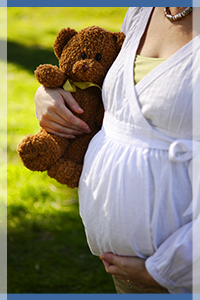Weeks 24 to 28 of Your Pregnancy

As you enter your 7th month of pregnancy, your baby's lungs are growing stronger and getting ready to breathe. By now your baby weighs nearly 1½ pounds and is about 11 to 14 inches long. You may notice that your baby responds to the sound of your or your partner's voice. You may also notice that your baby does less turning and twisting and more squirming or jerking. Jerking often means that your baby has the hiccups. Hiccups are perfectly normal and are only temporary.
This is a good time to start thinking about whether you want to have pain medicine during labor. Talk it over with your doctor. You may also want to consider attending a childbirth preparation or Lamaze class to learn how to breathe and relax during birth. Now would also be a good time to consider whether you want to meet a pediatrician during the pregnancy. You can call to request this appointment by calling our appointment center at 1-888-988-2800.
High blood pressure in late pregnancy can be a sign of preeclampsia. Make sure to watch for signs of preeclampsia, because it can harm your kidneys, brain, eyes, and liver. It can also cause problems with your baby’s growth. Watching for signs of early labor is also important. This care sheet can help you know the signs of preeclampsia and early labor.
As with every stage of pregnancy, this one can bring new discomforts. You may feel painful kicking, pelvic pressure, or pain; leak urine when you laugh or cough; or have swollen feet, ankles, hands, and fingers. Lying on your side can ease pelvic pressure. This care sheet has tips for how to ease other discomforts.
Follow-up care is a key part of your treatment and safety. Be sure to make and go to all appointments, and call your doctor if you are having problems. It’s also a good idea to know your test results and keep a list of the medicines you take.
How can you care for yourself at home?
Pay attention to your baby's movements
- You should feel your baby move several times every day.
- Your baby now turns less, and kicks and jabs more.
- Your baby sleeps 20 to 45 minutes at a time and is more active at certain times of day.
- If your doctor wants you to count your baby's kicks:
- Empty your bladder, and lie on your side or relax in a comfortable chair.
- Write down your start time.
- Pay attention only to your baby’s movements. Count any movement except hiccups.
- After you have counted 10 movements, write down your stop time.
- Write down how many minutes it took for your baby to move 10 times.
- If an hour goes by and you have not recorded 10 movements, count for another hour. If you do not record 10 movements in either hour, call your doctor.
Ease discomfort from your baby's kicking
- Change your position. Sometimes this will cause your baby to change position too.
- Take a deep breath while you raise your arm over your head. Then breathe out while you drop your arm.
Do Kegel exercises to prevent urine from leaking
- You can do Kegel exercises while you stand or sit.
- Squeeze the same muscles you would use to stop your urine. Your belly and rear end (buttocks) should not move.
- Hold the squeeze for 3 seconds, then relax for 3 seconds.
- Repeat the exercise 10 to 15 times for each session. Do three or more sessions each day.
Ease or reduce swelling in your feet, ankles, hands, and fingers
- If your fingers are puffy, take off your rings.
- Do not eat high-salt foods, such as potato chips.
- Drink 8 to 10 glasses of water each day.
- Put your feet up on a stool or couch as much as possible. Sleep with pillows under your feet.
- Do not stand for long periods of time or wear tight shoes.
- Wear support stockings.

